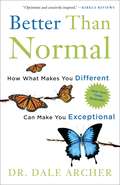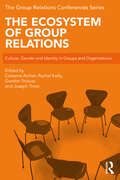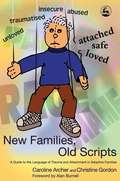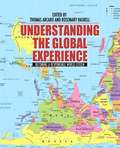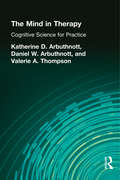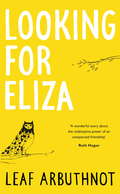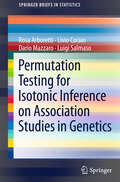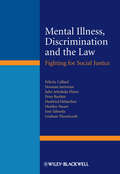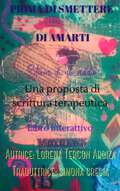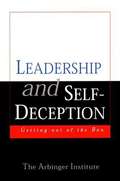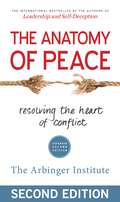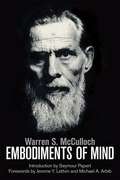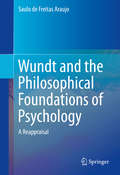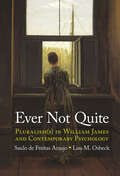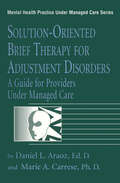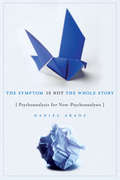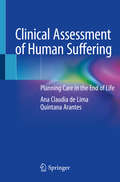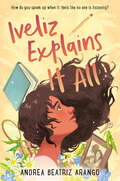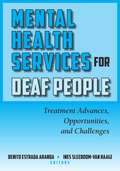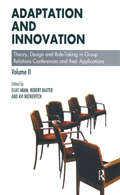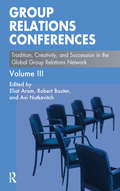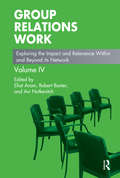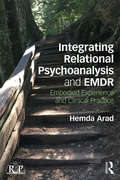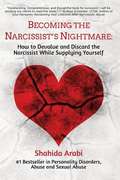- Table View
- List View
Better Than Normal: How What Makes You Different Can Make You Exceptional
by Dale ArcherA groundbreaking new view of human psychology that shows how eight key traits of human behavior--long perceived as liabilities--can be important hidden strengths.What if the inattentiveness that makes school or work a challenge holds the secret to your future as an entrepreneur? What if the shyness in groups that you hate is the source of deep compassion for others? What if the anxiety and nervousness you often feel can actually help energize you? What if the mood swings you sometimes experience canbe the source of tremendous creativity? Renowned psychiatrist and popular on-air personality Dr. Dale Archer believes that labels for behavior like "ADHD," "bipolar," and "OCD" are normal human qualities--and contends that we all experience these and other psychological traits to some extent, yet fail to leverage the significant advantages they can offer. Worse, we stigmatize one another for these prevalent, widely shared aspects of our personalities.In Better Than Normal, Dr. Archer offers an empowering framework for redefining what constitutes mental health. Drawing on his twenty years of clinical experience, he describes eight traits of human behavior--heretofore knownonly as psychiatric diagnoses. Each of these occurs along a continuum rather than as a simple on-off switch (where "off " means we're fine, and "on" means we've got a problem). These are the aspects of our personality that we worry about the most, but these are also the very things that make us distinctive and different.According to Dr. Archer, each of us has a unique personality that emerges from our hardwired genetics and individual life experiences. With Better Than Normal, you can map your individual characteristics by taking the eight traitself-assessment quiz and see how what makes you different can indeed make you exceptional. Filled with engaging anecdotes and practical tools to help you capitalize on your unique characteristics, Better Than Normal offers a new and liberating way to look at ourselves and others.
The Ecosystem of Group Relations: Culture, Gender and Identity in Groups and Organizations (The Group Relations Conferences Series)
by Coreene Archer Rachel Kelly Gordon Strauss Joseph TriestThe unconscious dynamics that surface in groups when authority is exercised are of paramount importance in Group Relations Conferences; this volume addresses these considerations through research findings and speculation on the future of Group Relations both within conferences and outside of them. This is the sixth instalment in a series of books based on Tavistock Group Relations Conferences and contains a collection of papers presented at the sixth Belgirate conference. Combining chapters on theory and practice, this volume delivers a meditation on the relationships between the physical spaces we inhabit or co-create, the psychic, inner or spiritual space and the liminal space in-between. Group Relations provides a window of understanding into why inequity and intergroup hostilities pervade the modern world alongside a method that illuminates how people consciously and unconsciously contribute to these tensions, whether personally, in groups or in organisations. This will be an invaluable resource for practitioners, academics, and scholars of Group Relations, as well as managers and organisational members wanting to learn more about how Group Relations methods can contribute to their organisational success.
New Families, Old Scripts: A Guide to the Language of Trauma and Attachment in Adoptive Families
by Caroline ArcherMost adopted children and their families will, sooner or later, encounter the challenges of dealing with unresolved attachment issues or early traumatic experiences. New Families, Old Scripts is an accessible introduction to understanding these challenges and helping children and their families to develop a shared language and understanding of one another. Steeped in the experience of the authors, the book offers a wealth of practical guidance and intervention in a no-nonsense style that will be readily understandable to both families and the professionals who work with them. Case examples bring the issues to life, while sample letters addressed to the parent offer sensitive, jargon-free advice on the issues they are likely to encounter - whether it be dealing with anger and aggression, understanding sibling issues or how to react to sexualised behaviour. The authors also explain some of the theoretical background to trauma to encourage a better understanding of the relationship between trauma, attachment and development. The accessible combination of theoretical approaches and practical advice makes New Families, Old Scripts an ideal resource for social workers and adoptive or foster parents. Family Futures Consortium provides services for parents and professionals working with adopted and fostered children, including training and consultation for statutory and voluntary agencies nationwide. In their therapeutic work with families, they have evolved a unique intensive, multi-disciplinary approach to supporting children with attachment and trauma-related difficulties.
Understanding the Global Experience: Becoming a Responsible World Citizen
by Thomas Arcaro Mathew Gendle Duane Mcclearn Laura Roselle Jean Schwind Kerstin Sorensen Anthony Weston Rosemary Haskell Jeffrey C. Pugh Robert G. Anderson Ann J. Cahill Chinedu Ocek" Eke Lawrence A. Basirico Jeffrey Pugh Anne Bolin Stephen Braye Ann Cahill Brian Digre Ocek EkeThis cross-disciplinary anthology of contemporary global issues explores a number of topics and methodologies critical to developing responsible world citizenship. Globalism, Globalization, Culture, Environmentalism, Western Imperialism, Global Media and News; Global Media and News. For anyone wishing to better understand globalization and its impact.
The Mind in Therapy: Cognitive Science for Practice
by Katherine D. Arbuthnott Dennis W. Arbuthnott Valerie A. ThompsonHuman mental capacities and processes are the raw materials with which psychotherapists work. Thus what cognitive scientists have discovered in recent decades is potentially tremendous value for psychotherapeutic practice. But the new knowledge is not readily accessible to therapists, who find both language and methodology off-putting.The Mind in Therapy bridges the gap. It offers a comprehensive overview of the relevant range of cognitive activities, ranging from complex mental operations such as problem solving, decision making, reasoning, and metacognition to basic functions such as attention, memory, and emotion. The authors integrate key new findings about the interaction between cognition and emotion, inhibition, and counterfactual thinking--processes that loom large in practice. Each chapter reviews an area of cognitive research, clearly explains the findings, and highlights their implications and applications in diverse models of therapy--cognitive, behavioral, psychodynamic, humanistic, and family. Each includes case vignettes that illustrate the ways in which the concepts are important and useful in practice.All therapists rely on the human mind to effect the change they seek. The clearer understanding of human cognitive capacities, idiosyncrasies, and limitations--their own as well as clients'--that they will gain from this book will enhance the effectiveness of both beginning and experienced practitioners, whatever their orientation.
Looking For Eliza
by Leaf Arbuthnot'Clever, warm and funny' - ADAM KAY'Beautifully rendered, thoughtful and original' - Pandora Sykes'A marvellous read' - Ruth HoganAda is a widowed writer, navigating loneliness in Oxford after the death of her husband. She has no children. No grandchildren. She fears she is becoming peripheral, another invisible woman. Eliza is a student at the university. She finds it difficult to form meaningful relationships after the estrangement of her mother and breakup with her girlfriend.After meeting through Ada's new venture, 'Rent-a-Gran', and bonding over Lapsang Souchong tea and Primo Levi, they begin to find what they're looking for in each other. But can they cast off their isolation for good? An exquisite story of connection and loss, and how a person can change another person's life. Full of heartache yet joyful and life-affirming, this is for fans of Normal People, Expectation and Sarah Winman's Tin Man.'Leaf's writing is warm and lyrically funny - she has an eye for details both sublime and ridiculous.Looking for Eliza is an intelligent and big-hearted read with the human condition at its core.' - Harriet Walker, The Times
Looking For Eliza
by Leaf Arbuthnot'Clever, warm and funny' - ADAM KAY'Beautifully rendered, thoughtful and original' - Pandora Sykes'A marvellous read' - Ruth HoganAda is a widowed writer, navigating loneliness in Oxford after the death of her husband. She has no children. No grandchildren. She fears she is becoming peripheral, another invisible woman. Eliza is a student at the university. She finds it difficult to form meaningful relationships after the estrangement of her mother and breakup with her girlfriend.After meeting through Ada's new venture, 'Rent-a-Gran', and bonding over Lapsang Souchong tea and Primo Levi, they begin to find what they're looking for in each other. But can they cast off their isolation for good? An exquisite story of connection and loss, and how a person can change another person's life. Full of heartache yet joyful and life-affirming, this is for fans of Normal People, Expectation and Sarah Winman's Tin Man.'Leaf's writing is warm and lyrically funny - she has an eye for details both sublime and ridiculous.Looking for Eliza is an intelligent and big-hearted read with the human condition at its core.' - Harriet Walker, The Times
Permutation Testing for Isotonic Inference on Association Studies in Genetics
by Rosa Arboretti Livio Corain Luigi Salmaso Dario MazzaroThe purpose of this book is to illustrate a new statistical approach to test allelic association and genotype-specific effects in the genetic study of diseases. There are some parametric and non-parametric methods available for this purpose. We deal with population-based association studies, but comparisons with other methods will also be drawn, analysing the advantages and disadvantages of each one, particularly with regard to power properties with small sample sizes. In this framework we will work out some nonparametric statistical permutation tests and likelihood-based tests to perform case-control analyses to study allelic association between marker, disease-gene and environmental factors. Permutation tests, in particular, will be extended to multivariate and more complex studies, where we deal with several genes and several alleles together. Furthermore, we show simulations under different assumptions on the genetic model and analyse real data sets by simply studying one locus with the permutation test.
Mental Illness, Discrimination and the Law
by Julio Arboleda-Flórez Peter Bartlett Heather Stuart José Taborda Graham Thornicroft Norman Sartorius Felicity Callard Hanfried HelmchenThis book describes clearly how legislation can be used to advance the rights and entitlements of people with mental health problems. Straightforward and practical, it provides useful information on how to address disabilities so these people may enjoy full citizenship. It presents the key issues succinctly and illustrates these with legislative examples from around the world. This book documents the role that law can play, at all levels, in combating such discrimination and abuse.
Prima di smettere di amarti: Storia di un addio
by Lorena Tercon ArbizaTutto nella vita ha una fine: il giro sulla giostra, il viaggio delle vacanze, l'amore e persino la vita stessa. La chiave sta nel saper trovare in quel culmine l'inizio della fase successiva della nostra vita. Questa è la storia di un addio, della fine di un amore e dell'inizio di una vita in libertà, accettazione di sé e autenticità. Questo libro è stato scritto in tempo reale, esattamente quindici giorni dopo la mia separazione. Grazie a questo approccio terapeutico alla scrittura, sono riuscita a superare il lutto molto più rapidamente di quanto non fossi riuscita a fare prima. Ecco perché ho creato questo libro interattivo, in cui vi propongo esercizi di scrittura terapeutica per guarire sia il vostro bambino interiore sia le ferite lasciate dalla vostra ultima relazione. State per iniziare un percorso di non ritorno al dolore e per aprire la porta all'avventura della vita. Benvenuti!
Leadership and Self-Deception: Getting Out of the Box
by Arbinger InstituteThe "disease" of self-deception (acting in ways contrary to what one knows is right) underlies all leadership problems in today's organizations, according to the premise of this work. However well intentioned they may be, leaders who deceive themselves always end up undermining their own performance. This straightforward book explains how leaders can discover their own self-deceptions and learn how to escape destructive patterns. The authors demonstrate that breaking out of these patterns leads to improved teamwork, commitment, trust, communication, motivation, and leadership.
The Anatomy of Peace
by ArbingerNEW EDITION, REVISED AND UPDATED Like Leadership and Self-Deception, The Arbinger Institute's first book, The Anatomy of Peace has become a worldwide phenomenon--not because of a media blitz, movie tie-in, or celebrity endorsement, but because readers have enthusiastically recommended it to colleagues, relatives, and friends. The Anatomy of Peace asks, What if conflicts at home, conflicts at work, and conflicts in the world stem from the same root cause? What if we systematically misunderstand that cause? And what if, as a result, we unwittingly perpetuate the very problems we think we are trying to solve? Through an intriguing story we learn how and why we contribute to the divisions and problems we blame on others and the surprising way that these problems can be solved. Yusuf al-Falah, an Arab, and Avi Rozen, a Jew, each lost his father at the hands of the other's ethnic cousins. The Anatomy of Peace is the story of how they came together, how they help warring parents and children come together, and how we too can find our way out of the struggles that weigh us down. This second edition includes new sections enabling readers to go deeper into the book's key concepts; access to free digital study and discussion guides; and information about The Reconciliation Project, a highly successful global peace initiative based on concepts in The Anatomy of Peace.
Embodiments of Mind
by Michael A. Arbib Jerome Y. Lettvin Seymour A. Papert Warren S. MccullochWarren S. McCulloch was an original thinker, in many respects far ahead of his time. McCulloch, who was a psychiatrist, a philosopher, a teacher, a mathematician, and a poet, termed his work "experimental epistemology." He said, "There is one answer, only one, toward which I've groped for thirty years: to find out how brains work." Embodiments of Mind, first published more than fifty years ago, teems with intriguing concepts about the mind/brain that are highly relevant to recent developments in neuroscience and neural networks. It includes two classic papers coauthored with Walter Pitts, one of which applies Boolean algebra to neurons considered as gates, and the other of which shows the kind of nervous circuitry that could be used in perceiving universals. These first models are part of the basis of artificial intelligence.Chapters range from "What Is a Number, that a Man May Know It, and a Man, that He May Know a Number," and "Why the Mind Is in the Head," to "What the Frog's Eye Tells the Frog's Brain" (with Jerome Lettvin, Humberto Maturana, and Walter Pitts), "Machines that Think and Want," and "A Logical Calculus of the Ideas Immanent in Nervous Activity" (with Walter Pitts). Embodiments of Mind concludes with a selection of McCulloch's poems and sonnets. This reissued edition offers a new foreword and a biographical essay by McCulloch's one-time research assistant, the neuroscientist and computer scientist Michael Arbib.
Wundt and the Philosophical Foundations of Psychology
by Saulo Freitas AraujoThis book reassesses the seminal work of Wilhelm Wundt bydiscussing the history and philosophy of psychology. It traces the pioneeringtheorist's intellectual development and the evolution of psychology throughouthis career. The author draws on little-known sources to situate psychologicalconcepts in Wundt's philosophical thought and address common myths andmisconceptions relating to Wundt's ideas. The ideas presented in this book showwhy Wundt's work remains relevant in this era of ongoing mind/brain debate and interestcontinues in the links between psychology and philosophy. Featured topics include: Theoretical and philosophical foundations of Wundt's early work in scientific psychology. Wundt's conception of scientific philosophy in relation to his theory of knowledge. The epistemological dimensions of Wundt's final project in scientific psychology. Wundt and thePhilosophical Foundations of Psychology is a valuable resource for researchers,professors, and graduate students in cognitive and related psychology andphilosophy disciplines.
Ever Not Quite: Pluralism(s) in William James and Contemporary Psychology
by Saulo de Araujo Lisa M. OsbeckWilliam James made many references to pluralism throughout his career. Interestingly, many contemporary psychologists also discuss pluralism and indeed call for pluralism as a corrective to the discipline's philosophical and methodological foundations. Yet, pluralism and the purposes to which it is applied are understood in a variety of ways, and the relation of contemporary pluralism to the pluralism(s) of William James is uncertain. This book offers conceptual clarification in both contexts, first distinguishing diverse senses of pluralism in psychology and then systematically examining different forms of pluralism across the writings of James. A comparison of meanings and analysis of implications follows, aimed at illuminating what is at stake in ongoing calls for pluralism in psychology.
Solution-Oriented Brief Therapy For Adjustment Disorders: A Guide
by Daniel L. Araoz Marie A. CarreseFirst published in 1996. Routledge is an imprint of Taylor & Francis, an informa company.
The Symptom Is Not the Whole Story: Psychoanalysis for Non-Psychoanalysts
by Daniel AraozA practical introduction to contemporary psychoanalysis that is accessible to all mental health professionals. Trained mostly in cognitive-behavioral methods and techniques, many recent graduates from psychology, counseling, family therapy, and other mental health programs have not been exposed to psychoanalysis as a vibrant, practical, and beneficial approach to human problems. In The Symptom is Not the Whole Story, Araoz introduces the functional benefits and applications of psychoanalysis for these practitioners. Focusing sharply on the unconscious and its use in psychotherapy, this no-nonsense book illustrates how psychoanalytical thinking can transform peopleâÄôs lives, thanks to the therapist's active interventions and destabilizing interpretations. Written in a vivid and clear style, where clinical examples pointedly illustrate the psychological issues at hand, this book reverses the commonly held idea that psychoanalysis requires years of treatment before showing results. Araoz's talent resides in his ability to teach mental health, marriage, and family counselors how to use psychoanalytic techniques without having been trained primarily in the discipline. All will find this book to be of particular benefit, discovering valuable guidance and applicable instructions for the use of psychoanalysis in their own therapeutic practice.
Clinical Assessment of Human Suffering: Planning Care in the End of Life
by Ana Claudia ArantesThis book is addressed to physicians and other health professionals involved in the assessment and care planning of patients at the end of life. It brings a unique and humanistic view on the challenges of good practice in palliative care. Concepts and definitions, resources and therapeutic alternatives, as well as symptoms of distress in the physical, emotional, family, social and spiritual dimensions are discussed in a clear and practical way, demystifying and dissolving the barriers of this approach.
Iveliz Explains It All: (Newbery Honor Award Winner)
by Andrea Beatriz ArangoHow do you speak up when it feels like no one is listening? In this moving novel in verse that Printz Honor-winning author Lisa Fipps calls "powerful," one girl takes on seventh grade while facing mental health challenges, and must find her voice to advocate for the help and understanding she deserves.Listen up:The end of elementary school?Worst time of my life.And the start of middle school?I just wasn&’t quite right.But this year?YO VOY A MI.Seventh grade is going to be Iveliz&’s year. She&’s going to make a new friend, help her abuela Mimi get settled after moving from Puerto Rico, and she is not going to get into any more trouble at school. . . .Except is that what happens? Of course not. Because no matter how hard Iveliz tries, sometimes people say things that just make her so mad. And worse, Mimi keeps saying Iveliz&’s medicine is unnecessary—even though it helps Iveliz feel less sad. But how do you explain your feelings to others when you&’re not even sure what&’s going on yourself?Powerful and compassionate, Andrea Beatriz Arango&’s debut navigates mental health, finding your voice, and discovering that those who really love you will stay by your side.
Mental Health Services for Deaf People: Treatment Advances, Opportunities, and Challenges
by Benito Estrada Aranda Ines Sleeboom-van RaaijThe World Congress on Mental Health and Deafness first met at Gallaudet University in October 1998, and it has convened five more times in the succeeding years. This volume collects the very best research presented at the Fifth World Congress, which took place in Monterrey, Mexico, in 2012. The eighteen international contributors represent the pioneers of mental health and deafness services in their respective countries. Volume editors Benito Estrada Aranda and Ines Sleeboom-van Raaij have divided the book into three parts--Mental Health Issues and Treatment, Deaf Populations, and Deaf Children and Their Families. In the first part, the contributors provide in-depth analysis of specific challenges and treatment modalities ranging from the provision of mental healthcare as a basic human right to psychopharmacological treatment, the challenges in developing mental health services for deaf and hard of hearing people in countries where none exist, and new treatment therapies. Part two looks at issues of self-esteem and cultural identity among deaf and hard of hearing adults in Greece and Cyprus, the services for deaf people at a public health clinic in Austria, and the quality of life among Latino Deaf bilinguals in the United States. In the last part, the contributors focus on mental health issues found in deaf children and adolescents and on the relationships between deaf teenagers and their hearing mothers. The volume concludes with a case study of a prelingually deaf child diagnosed as autistic. Taken all together, these cutting-edge articles explore the important issues within the specialized area of mental health and deafness.
Adaptation and Innovation: Theory, Design and Role-Taking in Group Relations Conferences and their Applications (The Group Relations Conferences Series)
by Eliat Aram Robert Baxter Avi NutkevitchThis book, the second in a series on Tavistock Group Relations Conferences, contains the collection of papers presented at the second Belgirate conference plus four additional papers reflecting on and making sense of several participants conference experiences. Taken together, these papers offer an exciting picture of the Group Relations enterprise as it continues to adapt and innovate its approaches to the practice of Group Relations conferences globally. It will be of interest to members of the group relations community as well as others who are agents of change and development in their professions and organisations, and who might use group relations thinking in their research, management, consultancy or educational roles.
Group Relations Conferences: Tradition, Creativity, and Succession in the Global Group Relations Network (The Group Relations Conferences Series)
by Eliat Aram Robert Baxter Avi NutkevitchThis book, the third in a series based on the Belgirate conferences, deals with the personal as well as the organisational journeys of Group Relations practitioners and examines these through the lens of tradition, succession and creative application.
Group Relations Work: Exploring the Impact and Relevance Within and Beyond its Network (The Group Relations Conferences Series)
by Eliat AramGroup Relations Work: Exploring its Impact and Relevance Within and Beyond its Network is composed of the presentations given at Belgirate IV, as well as some post conference reflections. The various chapters touch on the current flow of Group Relations as a discipline, as a method of work being applied and studied in Group Relations Conferences worldwide and in organizations, training programs, and in the understanding of social phenomena.The various chapters, while describing, articulating, exploring and conceptualizing theoretical and practical issues, are also opening various questions associated with Group Relations for further thinking and exploration. As such, this book reflects a chain at a certain point in time in the continuous practice and development of Group Relations as a discipline and a method of work.
Integrating Relational Psychoanalysis and EMDR: Embodied Experience and Clinical Practice (Relational Perspectives Book Series)
by Hemda AradIntegrating Relational Psychoanalysis and EMDR: Embodied Experience and Clinical Practice provides contemporary theoretical and clinical links between Relational Psychoanalysis, attachment theory, neuroscience, and Eye Movement Desensitization and Reprocessing, all of which bring both the patient’s and analyst’s embodied experience into the forefront of clinical thinking and practice. The author grounds an in-depth view on the ways psychoanalysis and EMDR can be effectively integrated to complement each other through a presentation of fundamental concepts and an abundance of insightful and moving clinical vignettes. Hemda Arad outlines the theoretical and clinical concepts that allow the integration of Relational Psychoanalysis with EMDR’s unique contributions, specifically appreciating the neurological and embodied experience in an individual’s development in relation to the classic talking cure’s approach to dealing with "big T" trauma and with "small t" everyday attachment-related trauma. Arad describes a view of a modified EMDR approach capable of reaching many patients, beyond the trauma work for which it originally became known, in order to lend its more embodied approach to the advancement of the relational endeavor. Vivid clinical illustrations, chosen to elucidate theoretical concepts, make the complex theoretical ideas more accessible. The clinical portions illustrate a range of ways that EMDR and relational work, which may at first seem incompatible, may be integrated to help therapists navigate the two methods. Integrating Relational Psychoanalysis and EMDR: Embodied Experience and Clinical Practice will appeal to psychoanalysts, psychoanalytic psychotherapists and psychodynamic therapists who wish to learn about the relational tradition in theory and practice or are seeking a way to integrate their work with other versatile approaches such as EMDR, as well as advanced students studying across these areas and EMDR clinicians who would like to broaden the scope of their skills.
Becoming the Narcissist's Nightmare: Ноw to Devalue and Discard the Narcissist While Supplying Yourself
by Shahida ArabiAlthough clinical research has been conducted on narcissism as a disorder, less is known about its effects on victims who are in toxic relationships with partners with Narcissistic Personality Disorder. Individuals with this disorder engage in chronic devaluation and manipulation of their partners, a psychological and emotional phenomenon known as "narcissistic abuse. " Unfortunately, the full extent of what narcissistic abuse entails is not taught in any psychology class or diagnostic manual. Since pathological narcissists are unlikely to seek treatment for their disorder, it is difficult to pinpoint what exactly makes a narcissistic abuser tick and the manipulative tactics they use, which are likely to differ from those of other types of abusers as they are more covert and underhanded. What is even more baffling is the addiction we form with our narcissistic abusers, created by biochemical bonds and trauma bonds that are also unlike any other relationship we experience. In this book, survivors will learn: *The red flags of narcissistic behavior and covert manipulation tactics, including subtle signs many survivors don't catch in the early stages of dating a narcissist. *The motives behind narcissistic abuse and techniques to resist a narcissist's manipulation. *Why abuse survivors usually stay with a narcissist long after incidents of abuse occur. *How our own brain chemistry locks us into an addiction with a narcissistic or toxic partner, creating cravings for the constant chaos of the abuse cycle. *Traditional and alternative methods to begin to detach and heal from the addiction to the narcissist, including eleven important steps all survivors must take on the road to healing. *Methods to rewrite the narratives that abusers have written for us so we can begin to reconnect with our authentic selves and purpose. *How to rebuild an even more victorious and empowering life after abuse. Narcissistic partners employ numerous stealthy tactics to devalue and manipulate their victims behind closed doors. These partners lack empathy and demonstrate an incredible sense of entitlement and sense of superiority which drives their exploitative behavior in interpersonal relationships. Their tactics can include verbal abuse and emotional invalidation, stonewalling, projection, taking control of every aspect of the victim's life, gaslighting and triangulation. Due to the narcissistic partner's "false self," the charismatic mask he or she projects to society, the victim often feels isolated in this type of abuse and is unlikely to have his or her experiences validated by friends, family and society. Using the latest scientific research as well as thousands of survivor accounts, this book will explore how the emotional manipulation tactics of narcissistic and antisocial partners affect those around them, particularly with regards to its cumulative socioemotional and psychological effects on the victim.
